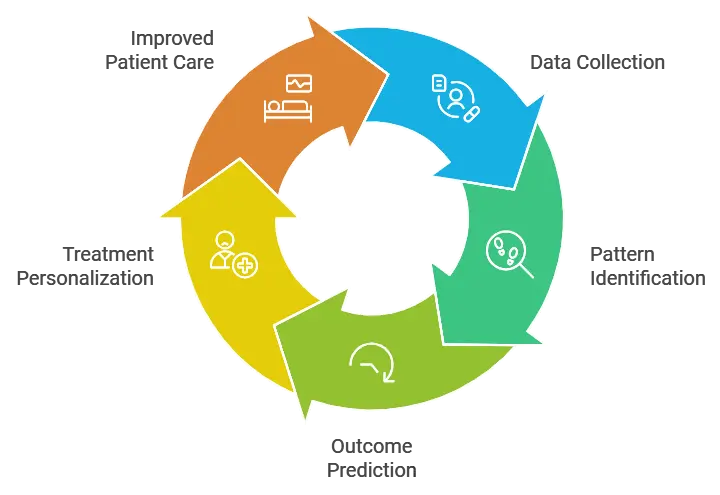Revolutionary AI in Healthcare: How AI is Revolutionizing Healthcare with Predictive Analytics and Personalized Medicine
The integration of AI in Healthcare has brought about transformative changes, especially in the fields of predictive analytics and personalized medicine. By analyzing vast amounts of medical data and identifying patterns, AI in healthcare has the potential to predict diseases before they manifest and tailor treatments to individual needs. This shift from generalized to personalized healthcare can improve patient outcomes, reduce healthcare costs, and pave the way for a new era in medical science. This article explores the ways in which AI in healthcare is revolutionizing the industry through predictive analytics and personalized medicine, along with the benefits, challenges, and future possibilities.

Table of Contents
ToggleIntroduction to AI in Healthcare
What Is AI in Medical Diagnosis?

AI in Healthcare is reshaping the healthcare landscape by providing new insights, enhancing diagnostic accuracy, and enabling personalized treatment plans. Through predictive analytics and personalized medicine, AI algorithms analyze extensive medical datasets—including patient records, genetic information, and lifestyle data—to identify patterns and predict individual health outcomes. These advancements in AI in healthcare hold immense potential for early disease detection, precision treatment, and improved patient care.
What is Predictive Analytics in Healthcare?
Predictive analytics allows healthcare providers to anticipate disease risks in patients and take preventive action before symptoms emerge. For instance, AI can analyze EHRs to detect early signs of chronic diseases like diabetes or cardiovascular conditions, enabling doctors to intervene sooner with personalized lifestyle recommendations or treatments.
• IBM Watson Health has developed predictive analytics models to identify high-risk patients and deliver targeted healthcare interventions. Their predictive algorithms help healthcare providers make informed decisions that can prevent hospital readmissions and reduce healthcare costs.
AI-based predictive analytics supports hospital resource management by forecasting patient admission rates, optimizing bed allocation, and ensuring the availability of medical supplies. During the COVID-19 pandemic, predictive analytics helped hospitals anticipate spikes in patient numbers, allowing them to allocate resources more effectively.
• Mayo Clinic uses predictive analytics to estimate the demand for hospital resources, optimizing staffing schedules and preparing for patient surges based on past data and seasonal trends.
AI algorithms analyze patients’ genomic data to determine how they will likely respond to specific treatments. This data-driven approach reduces the risks of adverse drug reactions and allows healthcare providers to offer genetically tailored treatments. Known as pharmacogenomics, this application of AI improves outcomes for patients with complex conditions that require highly specific treatments.
• 23andMe, a genetics company, uses AI to analyze customer DNA data, offering personalized insights about medication sensitivities and genetic predispositions to certain conditions.
• Atomwise, a biotechnology company, employs AI to screen millions of compounds and predict which might interact effectively with target diseases, resulting in faster drug discovery for diseases like Ebola and ALS.
Benefits of AI in Predictive Analytics and Personalized Medicine
Implementing AI in healthcare brings a variety of benefits, including:
Predictive analytics enables early detection of diseases, allowing for timely interventions that improve outcomes and reduce treatment costs.
AI-powered personalized medicine reduces trial-and-error prescribing, leading to faster, more effective treatments for patients.
AI reduces resource waste by identifying at-risk patients and optimizing treatments, resulting in cost savings for healthcare providers and patients alike.
With personalized treatments tailored to individual genetics and lifestyles, patients experience improved recovery rates and overall health.
Predictive analytics streamlines hospital operations, helping administrators better manage resources and reduce wait times.
Challenges and Ethical Considerations in AI
AI models require vast amounts of patient data, which raises concerns about privacy and data security. Protecting this information is critical, especially in an era of increased cyber threats.
AI algorithms can inherit biases from the data they are trained on, potentially leading to unfair or discriminatory outcomes. Ensuring fairness in predictive analytics models is essential.
Implementing AI in healthcare requires significant investments in technology, training, and infrastructure, which can be prohibitive for smaller institutions.
The rapid evolution of AI in healthcare makes it challenging for regulatory bodies to keep pace, leading to uncertainties in compliance requirements.
AI in Healthcare Case Studies
Cleveland Clinic implemented AI-driven predictive analytics to identify patients at risk of developing heart disease. By analyzing EHR data, the model successfully predicted heart disease risks, enabling doctors to implement preventive care measures. This initiative significantly improved patient outcomes, reducing the occurrence of heart attacks and associated complications.
Foundation Medicine uses AI to analyze cancer patients’ genetic information to identify personalized treatment options. By tailoring treatments based on a patient’s specific cancer mutation, Foundation Medicine has helped improve response rates and patient outcomes in cases of complex cancers.
BlueDot, an AI-driven health monitoring company, uses predictive analytics to detect outbreaks of infectious diseases. During the COVID-19 pandemic, BlueDot’s AI model accurately predicted the spread of the virus, enabling governments and healthcare organizations to take proactive measures.
Conclusion
The role of AI in healthcare through predictive analytics and personalized medicine is transformative, enhancing diagnostic accuracy, patient outcomes, and treatment effectiveness. Despite challenges in privacy, bias, and regulation, AI’s potential for early disease detection and personalized treatment promises a future where healthcare is more precise, proactive, and patient-centered. As technology continues to evolve, AI-driven healthcare solutions will likely become indispensable, making high-quality, personalized care accessible to more people worldwide.